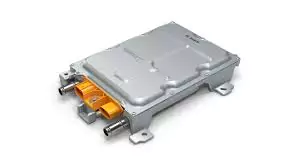BMS For Electric Vehicles
What is a Battery Management System BMS for Electric Vehicles?
A Battery Management System, commonly known as BMS, is an electronic unit that monitors and controls the performance of EV batteries. It controls voltage, temperature, and state of charge, which are critical parameters for the safe operation of batteries in EVs.
Functions of Battery Management System for Electric Vehicles
Fitting an EV with a BMS for electric vehicles can improve safety. The battery management system performs the following four functions:
1. Monitoring battery parameters
2. Managing thermal temperatures
3. Making key calculations
4. Facilitating internal and external communication
ABOUT BMS
- 14-20 cell BMS with Liion/LiFePO4
- 4 temperature channels
- Separate Charging and discharging Paths (Can be combined)
- Hardware over-current and short-circuit protection
- Continuous discharge current up to 50A (Configurable)
- Charging Current upto 15A
- Overcurrent Protection – 60A for 5Sec
- Short Circuit Protection – 200A
- Battery Temperature Cutoffs – <-10 and >60 degC
- Sleep mode current < 5mA
- Serial Communication port for reading the battery pack power information including battery voltage, current, temperature, and battery-related information.
- Configurable Cell/Pack UV/OV, Currents, Temp, Balancing cutoffs
- Dimension = 105mm x 95mm x 20mm (Excluding wire bending space)
Optimize Your Battery Performance with Smart BMS Solutions!
Automotive Battery Management System Electric Vehicle (BMS)

Automotive Battery Management Systems (BMS) must be ready to meet critical features like voltage, temperature and current monitoring, battery state of charge (SoC) and cell balancing of lithium-ion (Li-ion) batteries.

Indeed, the most functions of Automotive battery Management System for electric vehicles are:
- E-Mobility BMS Battery protection so as to stop operations outside its safe operating area.
- Automotive BMS Battery monitoring by estimating the battery pack state of charge (SoC) and state of health (SoH) during charging and discharging.
- BMS Battery optimization because of cell balancing that improves the battery life and capacity, thus optimizing the golf range for hybrid (HEV), plug-in (PHEV) and full electric vehicles (BEV).
- Take a deep dive into the architecture of Automotive battery management systems (BMS) solutions, providing insights into critical parameters for automotive and other applications, like battery systems.
- The BMS is vital to the continued electrification of vehicles. However, e-mobility (electromobility) has additional advantages just like the reduction of moving parts.
- Automotive battery management solutions (BMS) are specifically designed to satisfy the stringent safety, reliability and performance requirements of next generation electric vehicle applications.
The Future of BMS in Electric Vehicles
As electric vehicle (EV) technology continues to advance, Battery Management Systems (BMS) are evolving rapidly to meet growing demands. The next generation of BMS will be smarter, safer, and more integrated than ever before
One of the most promising enhancements is the use of predictive analytics, which leverages machine learning and historical data to forecast key metrics like state-of-charge (SOC) and battery health. This proactive approach allows for better battery maintenance, longer lifespan, and optimized energy use—directly improving the overall efficiency of EVs.
Future BMS are also expected to incorporate enhanced safety mechanisms. These systems will be capable of detecting potential issues early through advanced algorithms and real-time data monitoring, helping to prevent failures before they occur.
Moreover, improved system integration will allow BMS to communicate seamlessly with other EV components like the motor controller and onboard computer. This deeper interaction will support smoother vehicle operations, resulting in better performance and an elevated user experience.
In short, the future of BMS is intelligent, interconnected, and designed to power the next wave of electric mobility.
Devendra Automobile offers expertise in automotive embedded engineering, providing bms for electric vehicles to enhance battery performance.
DAPL offers expert services in BMS for electric vehicles in Pune, helping EV manufacturers and developers implement smart, efficient, and reliable battery management solutions. As electric mobility advances, having a robust BMS is essential for optimizing battery performance, ensuring safety, and improving vehicle lifespan. DAPL ensures your battery systems are future-ready with integration support, predictive analytics, and customized consultation.
Our Battery Management System for electric vehicles in Pune is designed to meet industry standards while enhancing real-time monitoring and vehicle efficiency. Whether you’re developing two-wheelers, passenger EVs, or commercial electric vehicles, DAPL provides tailored BMS consultation and deployment that aligns with your goals and regulatory compliance. Trust DAPL for dependable and intelligent EV battery management in Pune.

Battery Management System Electric Vehicle (BMS) India, Automotive Battery Management Systems India, HEV , plug-in (PHEV) , EV-BMS, Electric Vehicles BMS India, Automotive BMS India, bms for electric vehicles in Pune, battery management system for electric vehicles in Pune
Drive the Future with Devendra Automobiles!
Battery Management System BMS for Electric Vehicles in Pune
Upgrade your ride with the latest in performance, style, and reliability. Whether you need a new vehicle or top-notch service, we've got you covered.

